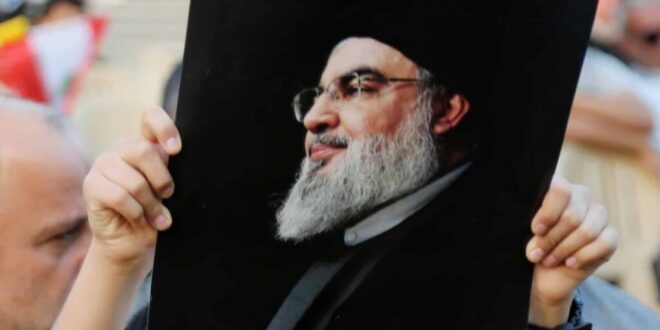A Jordanian population sympathetic to Iran’s ambitions, coupled with the country’s long border with Israel, could turn Jordan into a potential launching pad for attacks against Israel.
Jordanians marched in the capital of Amman last week, holding aloft portraits of the late secretary general of Hezbollah, Hassan Nasrallah. The streets echoed with chants of “Labayk ya Nasrallah” (“We are here, oh Nasrallah”), a Shia chorus of devotion rarely heard in Jordan, which is almost entirely Sunni. Since October 7, it is not just support for Hamas that is rising, but also for other groups within the so-called “axis of resistance” led by Tehran. This trend only adds to the troubles of Jordan’s king, Abdullah II, who finds it ever harder to justify his alignment with Washington to subjects resentful of both economic stagnation and American support for Israel.
More than half of Jordan’s population—perhaps as much as 65 percent—is of Palestinian descent. The country’s unemployment rate is now 21 percent. The people’s sympathy for the Palestinians has always been evident, but increasingly, it takes the form of support for Hamas. At protests on the Palestinians’ behalf, the marchers chant, “Put the bullet in the chamber…We are your men, [Yahya] Sinwar” and “Our army is the army of the free…We are your soldiers, oh Sinwar.” In one instance, demonstrators held a mock funeral for Ismail Haniyeh, the Hamas leader slain by an Israeli bomb in Tehran.
The Islamic Action Front (IAF), which won the most seats in last month’s parliamentary election, has worked to radicalize the population. The IAF is the political arm of the Muslim Brotherhood, the organization from which Hamas also sprang. Iran’s role has been more subtle. Khaled Meshal, the senior Hamas official, helped rouse the population to “take the responsibility” in dealing with Israel during a visit of the Hamas political bureau to Tehran.
The Jordanian government has sought to balance its foreign policy and domestic challenges since October 7 by criticizing Israel constantly while taking little action that might antagonize either Washington or Jerusalem. Iran’s missile strikes on Israel in April and earlier this month made Jordan’s balancing act even more difficult to pull off since Washington expected Jordan to play its assigned role in the U.S.-led air defense network, which it did.
By portraying their military activities as part of a larger mission to confront Israel and liberate the Palestinians, Iran, and its proxies have helped to reverse negative sentiments towards Tehran and its partners that prevailed less than a decade ago. A poll conducted by the Washington Institute in 2015 indicated that Jordanians hold overwhelmingly negative views towards all key players in the Syrian Civil War, especially Iran’s proxies. When asked to assess the actions of these actors, 91 percent of Jordanians rated the Syrian government negatively, while Hezbollah received an 86 percent negative rating.
Positive sentiment toward Hamas intensified after October 7, although it has a long history in Jordan. When Hezbollah entered the conflict in solidarity with Hamas on October 8, its popularity in Jordan began to grow, especially among those of Palestinian descent. Nasrallah’s death led to another visible increase in support, with the IAF calling for a protest “in condemnation for the assassination of the martyr Hassan Nasrallah.”
Previously, the party had often criticized Iran and its proxies for their crimes in Syria. A statement the party issued in 2012 announced it was “boycotting any activities or events organized by the Iranian government, whether in Jordan through its embassies or in Iranian cities, as an expression of protest against Iran’s position in supporting the Syrian regime against the Syrian revolution.” This statement, of course, no longer reflects the IAF’s policy, as its leadership attended Haniyeh’s funeral in Tehran.
While explicit declarations of support for Iran and its supreme leader remain rare, Tehran has employed its proxies to challenge Jordanian security in an unprecedented manner. Investigations uncovered smuggling networks using Jordan as a corridor for transporting weapons from Syria and Iraq into the West Bank, with authorities dismantling arms-smuggling cells in March and June. Additionally, Kataib Hezbollah, an Iran-backed Shia militia in Iraq, has threatened to arm 12,000 Jordanians to attack Israel. Once, these kinds of actions might have provoked a backlash from Jordanians who resented Iranian interference. But no longer.
Iran aims to increase its influence in Jordan by presenting itself as a champion of the Palestinian cause. A Jordanian population sympathetic to Iran’s ambitions, coupled with the country’s long border with Israel, could turn Jordan into a potential launching pad for attacks against Israel. While Israel is aware of this threat and works with Jordanian authorities to mitigate it—such as by intercepting drones from Iraq that enter Jordanian airspace—addressing this issue requires more than just security measures like border control. There must also be a focus on monitoring and countering the pro-Iran rhetoric emerging in protests and popular demonstrations.
 Eurasia Press & News
Eurasia Press & News




